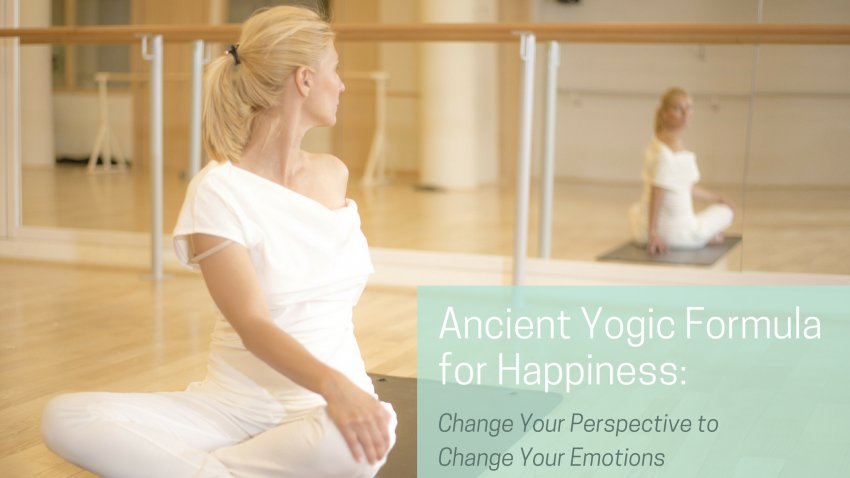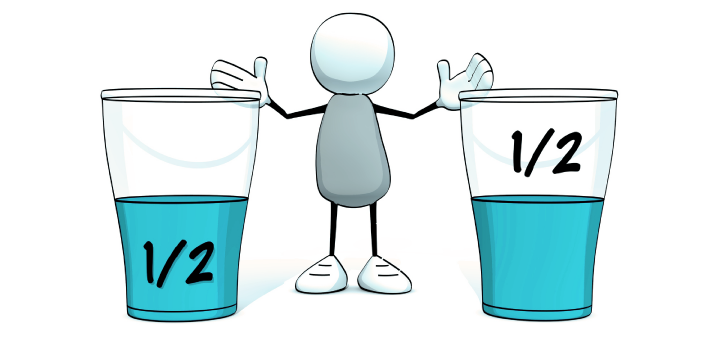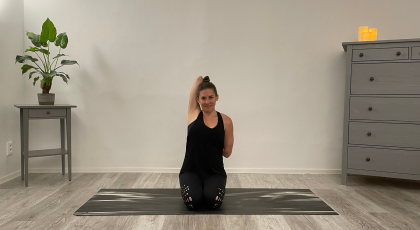View basket (0 items $0.00)
Error message
- Notice: unserialize(): Error at offset 5 of 154 bytes in variable_initialize() (line 1202 of /home/dh_6hcdc2/yogau.online/docroot/includes/bootstrap.inc).
- The file could not be created.
- The file could not be created.

An Ancient Yogic Formula for Happiness: Change Your Perspective to Change Your Emotions
I used to have a rather complicated relationship with my paternal grandmother. When I was little she had a looming presence in my life, often shaming me for the smallest of real and perceived indiscretions. I grew up with this uneasy feeling that I should always be ashamed of myself for something, but it never came up to the level of conscious examination.
When I moved to the United States almost 20 years ago, my grandmother wrote me a scathing letter. Each line of it was dripping with disdain. She accused me of betraying my country that my grandfather had fought for in the World War II, said that she couldn’t bear to look her friends in the eye because of me, and so on. I was stunned but filed that experience away without really facing it. The letter continued to pop up in my consciousness throughout the years, paired with that uneasy feeling of shame.
One day I mentioned the letter to my friend and she had an unexpected reaction. She said: “What a gift your grandmother gave you!” What?! A gift?! “Well,” she continued, “before the letter you had no idea why you kept feeling shame for no reason, but the letter brought it out in the open. It also showed you that it is much more about your grandmother’s demons than your own.”
Just like that, the letter completely lost its menacing power and became an important tool in my self-exploration. The letter itself hadn’t changed, but the way I looked at it had changed dramatically. This is an example of what yoga tradition calls pratipaksha bhavana, and modern science refers to as “cognitive reframing” or “reappraisal.”
Yoga sutra 2.33 recommends: “When disturbed by negative thoughts, cultivate the opposite mental attitude.” (Vitarka-badhane pratipaksha-bhavanam). Kevin Ochsner, who studies the neuroscience of reappraisal at Columbia University, puts it this way: “Our emotional responses ultimately flow out of our appraisals of the world, and if we can shift those appraisals, we shift our emotional responses.” Reappraisal basically means consciously choosing how you perceive any situation, which has an impact on the kind of emotions that will emerge from it.

For example, we use the image of a glass half full or half empty to describe how different people see the world. The proverbial glass is the same, but where an optimist sees abundance and opportunity, a pessimist sees a reason to despair. We tend to think of it as a genetic predisposition, an inherent characteristic that each one of us has, but often it is situational. After all, the glass is never just a glass. The mind interprets the glass through the lens of the current environment and past experience and tries to fit it in somewhere within the map of our world. The sutra (and neuroscience) tells us that you have a choice in how you interpret that glass, as long as you put a conscious effort into it.
The implications of that proposition are huge. Since our emotions flow out of our perception of the world, if that perception is reframed, our emotions will change too. This applies to mundane experiences (for example, choosing not to be bothered by traffic and instead enjoy an audiobook that you are listening to) and life-altering events (for example, choosing to see downsizing at work as an opportunity to pursue your true calling).
Science shows that simply having a perception of choice in any given situation helps you feel less fearful and uncertain. Ochsner says, “Finding a way to make a choice, however small, seems to have a measurable impact on the brain, shifting you from an away response to a toward response.” When you are in a “toward” state of mind, it is much easier to reflect on the situation and come up with a more effective solution. So it goes like this: first you recognize that you have a choice in how you react; then you make a choice to act in a way that would be more beneficial to you, and the consequences of that choice can change the course of your day, your relationship, your career, or your life.
This is what makes reappraisal so incredibly powerful. My reappraisal of that letter made me much more compassionate and understanding toward my grandmother, and helped me release a lot of inner baggage. We have a much better relationship now, not because we’d buried the hatchet (there was nothing to bury), but because we both reframed the way we perceived each other. Reappraisal is not about suppressing or avoiding; it is about changing the outlook.
Study core strength and so much more with Olga Kabel and YogaUOnline - Yoga for Posture Improvement with Focus on Core Strengthening and Axial Extension.
Also, Read Olga Kabel's article and change your perspective on pain - Yoga and the 5 Kosha Model: Healing Chronic Pain on All Levels of Your Being.
Reprinted with permission from Sequence Wiz.
 Educated as a school teacher, Olga Kabel has been teaching yoga for over 14 years. She completed multiple Yoga Teacher Training Programs but discovered the strongest connection to the Krishnamacharya/ T.K.V. Desikachar lineage. She had studied with Gary Kraftsow and American Viniyoga Institute (2004-2006) and received her Viniyoga Teacher diploma in July 2006 becoming an AVI-certified Yoga Therapist in April 2011. Olga is a founder and managing director of Sequence Wiz- a web-based yoga sequence builder that assists yoga teachers and yoga therapists in creating and organizing yoga practices. It also features simple, informational articles on how to sequence yoga practices for maximum effectiveness. Olga strongly believes in the healing power of this ancient discipline on every level: physical, psychological, and spiritual. She strives to make yoga practices accessible to students of any age, physical ability and medical history specializing in helping her students relieve muscle aches and pains, manage stress and anxiety, and develop mental focus.
Educated as a school teacher, Olga Kabel has been teaching yoga for over 14 years. She completed multiple Yoga Teacher Training Programs but discovered the strongest connection to the Krishnamacharya/ T.K.V. Desikachar lineage. She had studied with Gary Kraftsow and American Viniyoga Institute (2004-2006) and received her Viniyoga Teacher diploma in July 2006 becoming an AVI-certified Yoga Therapist in April 2011. Olga is a founder and managing director of Sequence Wiz- a web-based yoga sequence builder that assists yoga teachers and yoga therapists in creating and organizing yoga practices. It also features simple, informational articles on how to sequence yoga practices for maximum effectiveness. Olga strongly believes in the healing power of this ancient discipline on every level: physical, psychological, and spiritual. She strives to make yoga practices accessible to students of any age, physical ability and medical history specializing in helping her students relieve muscle aches and pains, manage stress and anxiety, and develop mental focus.
Featured Courses








